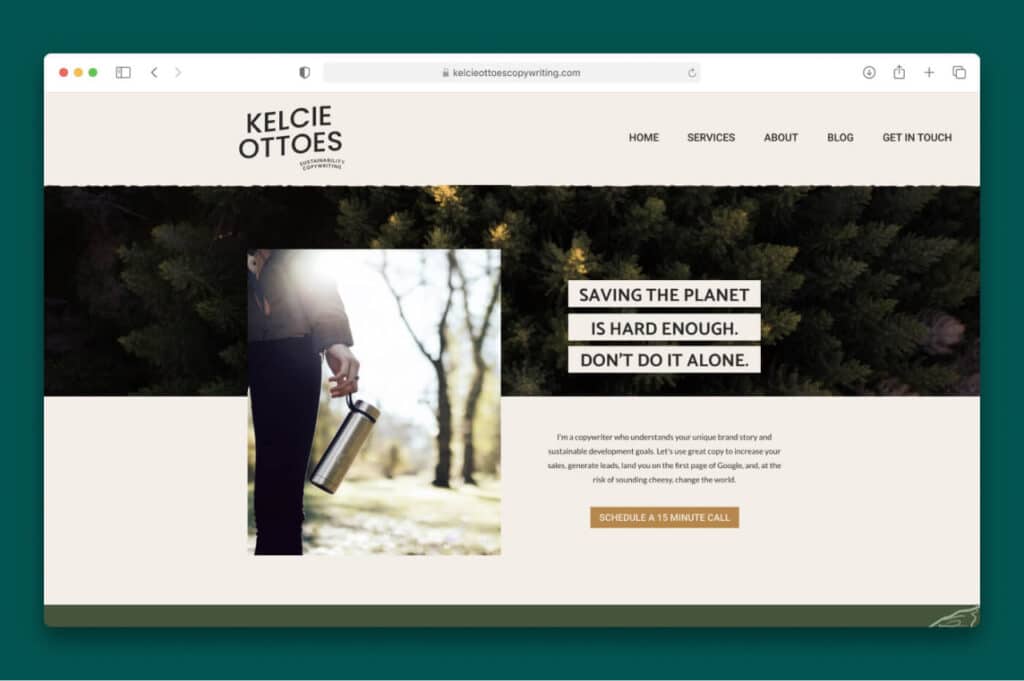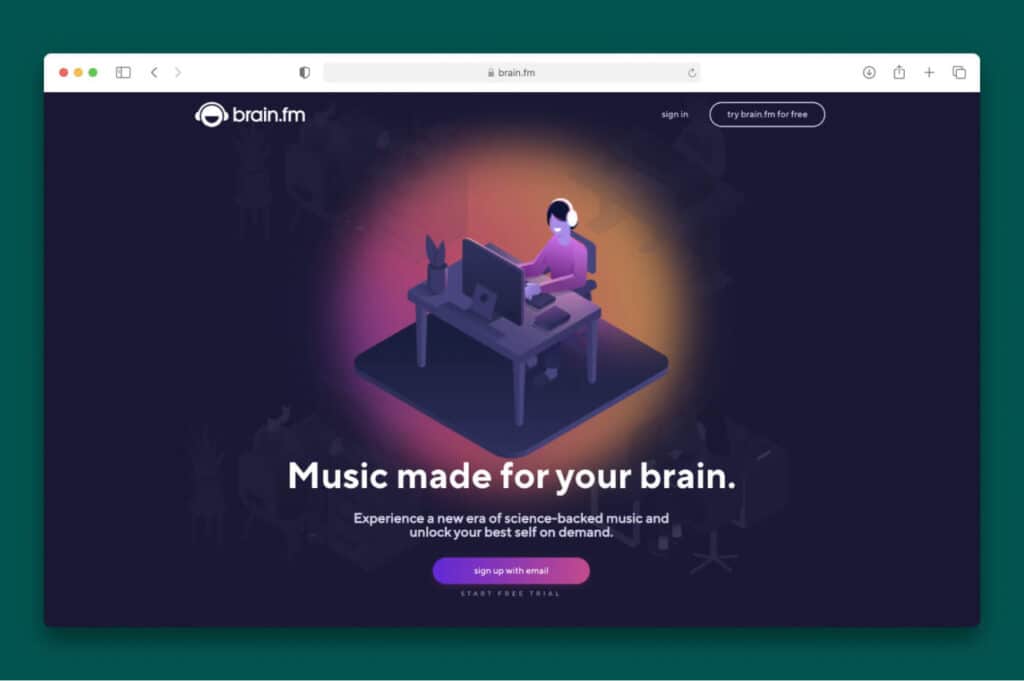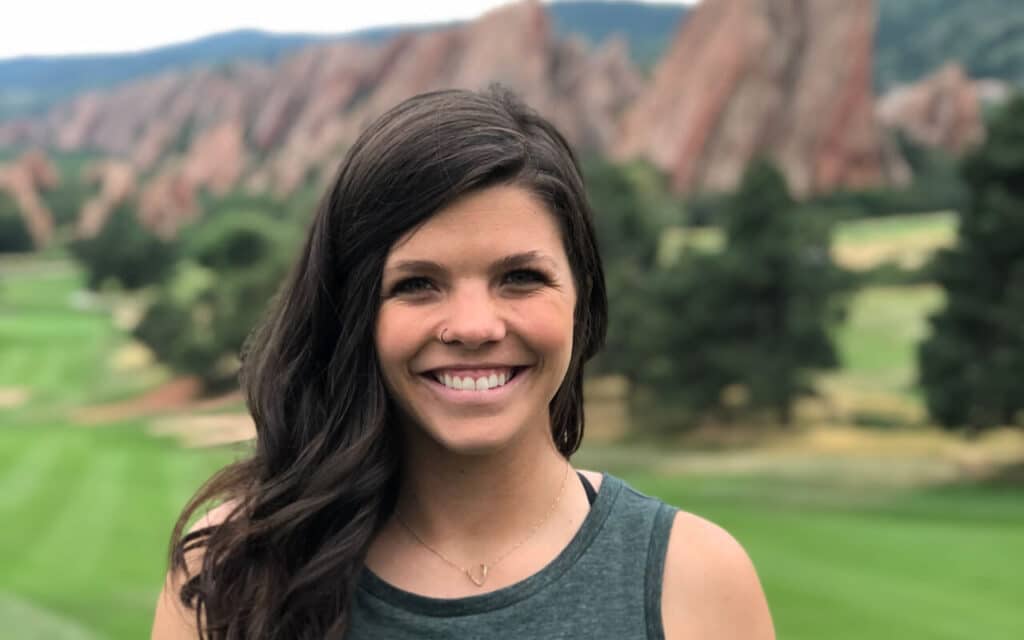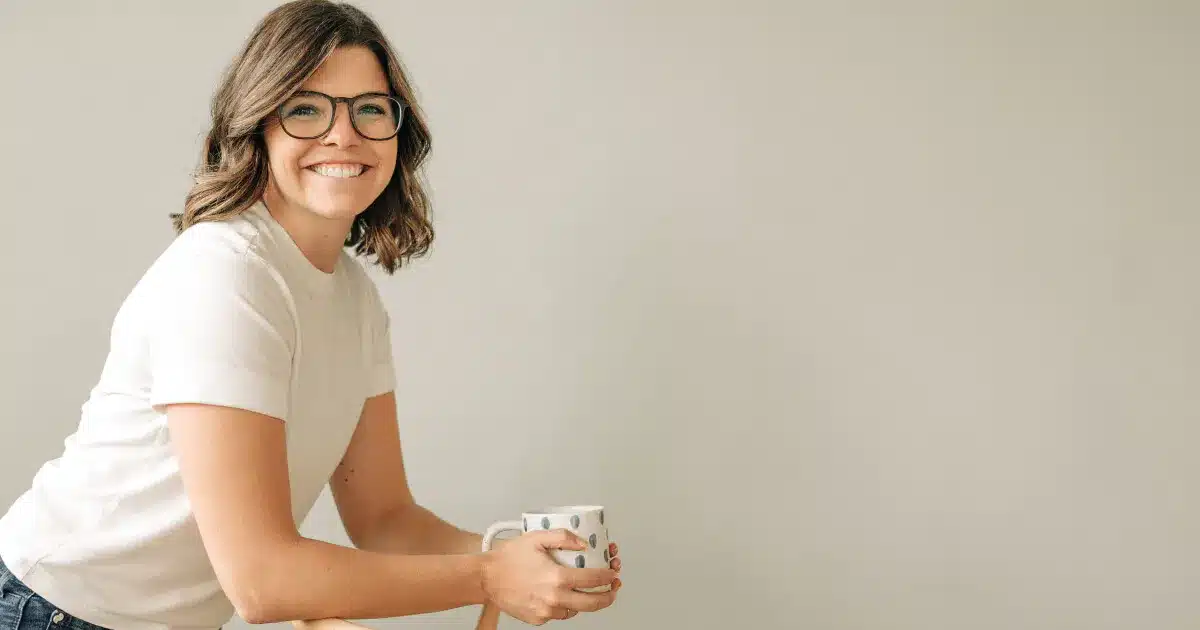Kelcie Ottoes is a copywriter who works with sustainable businesses and businesses that authentically champion sustainability.
She’s completed projects like video scripts, product descriptions, full website rewrites, case studies, white papers, email campaigns, and more.
In her smallest capacities, she provides content strategy and website audits. In her largest capacity, she can manage the content strategy and content creation across all of a brand’s copy landscape.
She is incredibly excited about her done in a day service, allowing smaller sustainable businesses to get 3 important email sequences written, designed, and implemented. All in one day!
She has her eyes set on writing white papers more regularly in the coming months and is starting a newsletter about her journey of landing and writing this elusive type of copy.
How Did You Become a Writer?
I tried to figure out how to become a professional (and paid) writer a couple of years ago after being fired from a job I hated.
I couldn’t figure out how anyone made ends meet at $0.01/word. I was served an ad for a course called Write Your Way to Freedom, but it sounded too good to be true, so I never signed up for anything more than an email list.
Fast forward two years. I’m at another job where I feel complacent, and I meet up with an old friend who’s now a copywriter. She says she took a course a year ago called Write Your Way to Freedom, which changed her life. Yes, the same course from two years ago.
So, I took the leap. I borrowed money from my fiance and enrolled. It was the best decision I’ve ever made.

I niched down into sustainability quickly, as I wanted to do something I loved that could do my part to leave our planet better than I found it. I started reaching out to everyone I knew in August, letting them know I had started this business.
On April 1st, 2022, I quit my 9 to 5 and have never looked back!
How Did You Get Your First Writing Job?
My first writing job was with a zero-waste ecommerce store.
Someone in one of the Facebook groups I’m in posted about the opportunity.
The shop owner couldn’t pay me, but I could use what I wrote for them as a portfolio piece and a testimonial. I pitched, he accepted the topic, and I started writing.
When I turned in the blog post, I ended the email with, “If you ever end up with a bit of a budget for your blogs, I’d love to help.”
He responded, “How much of a budget would I need?”
We hopped on a call, and we still work together to this day.
I’m paid a lot more now than I was initially because I’ve been a big part of his website growth strategy. We’ve found a way to make keywords work for his business.
But I originally took the job without compensation as I saw an opportunity to grow my experience and authority. I wanted a testimonial and a great portfolio piece. I worked hard to turn in the best blog possible, and it helped me land my first paid client.
I truly believe that no opportunity is too small when you’re starting. But try and maximize the benefits if you won’t be compensated. Deliver a little extra value each time. And always, always, always shoot your shot!
What Skills Do You Need to Be a Good Writer?
To be a good writer, you must also be a good listener.
You have to be willing to slow down and get to the heart of an issue, even if people don’t know what the heart of the issue is.
It can be hard to understand things people may not understand themselves.
I also think the best writers are also incredibly strategic.
They’re always looking for ways to make their client’s life better or their business more successful.
A good writer isn’t an order taker. They’re a strategic partner ready to improve the business with their ideas and words.
What Influences Your Writing the Most?
I use the hero’s journey pretty regularly in my writing.
I want the reader to feel the call to adventure, align with the mission, and feel transformed at the end.
It may sound cheesy, but it’s the oldest writing framework. And if it’s not broken, don’t fix it, right?
I also infuse pop culture whenever I can!
Whether it’s a great throwback, like a Mortal Combat reference, or keeping up with the latest trends, like mentioning episode 4 of this season’s Stranger Things, pop culture allows writers and businesses to connect with their audience.
It says to those reading it who resonate with those things, “We see you. You’re our people. You’re in the right place.”
What Tools and Software Do You Use for Work?
I’m currently in the middle of a big move to Dubsado, which is intimidating and exciting.
Until now, I’ve used HelloBonsai as a simpler way to manage my contracts and invoices. My website is hosted on Showit, which has a hard learning curve but is fun to customize!
I always use Quetext for plagiarism and the Hemingway app to double-check my writing level.
What Are Your Writing Habits?
It could probably go in the software I use, but I love putting on a Brain.fm channel and focusing on the content I’m creating.

Brain.fm’s focus music is composed to help you work better, by blending into the background so you can focus.
I can concentrate on the copy by blocking out my dirty floors, unmade bed, and unwashed dishes.
If I’m writing, I also always have at least three drinks. A coffee, water, and something fun like tea or a smoothie. Or maybe a glass of wine if it’s after 5:00 and I’m wrapping something up.
My writing process is (unfortunately) built on procrastination.
I need my back to the wall sometimes to get going. But I’m trying to be more intentional about batch writing my content and getting things done ahead of time!
It’s tough to change a writing process.
I worked in a Writing Center for five years (this was not either of the lame jobs), and we learned a lot about how hard it is to change your writing process but how worthwhile it can be if your writing process gives you anxiety or stress.
I know that writing, even when it feels uncomfortable to make me less of a procrastinator, will be worth it in the long run.
What’s the Best Investment You Made in Your Career?
Two programs have helped me become a better writer.
Write Your Way to Freedom taught me how to set up a writing business, from start to finish.
There are a lot of programs that will teach you how to write something, but not a lot that will teach you how to negotiate a contract and set up an LLC.

I’m so grateful I started with WYW2F because I learned how to be a business owner in tandem with being a writer.
I also invest in the Copywriter Club accelerator, which has made a huge difference in my network, how I present myself as a copywriter, and my confidence with pricing. I understand the value I’m bringing and have tangible next steps for where I want to take my business.
I’d recommend either of these programs to anyone.
What Are the Most Influential Books in Your Life?
I loved Six-Figure Freelancer by Laura Briggs!
It’s an amazing book for anyone starting their career as a writer or wanting to scale quickly. She puts so much great information into the book. I’m excited to reread it soon!
When I need a mindset shift, I revisit The Slight Edge. It’s a pretty simple concept, do what you need to do and don’t put it off, but I like the storytelling and framing that goes into delivering the message. I regularly walk around my house saying, “Easy to do, easy not to do.”
My favorite book of all time is The Perks of Being a Wallflower. I reread it in challenging seasons of life. And I always take something new from it.
What Are Your Favorite Writing Quotes?
I don’t have any favorite quotes about writing! Maybe I should get some?!
If Someone Wants to Be Where You Are Now, How Can They Get There?
I went from making $200 my first month to $10,000+ the last three months. My business will hit its first anniversary in August.
To get here: The first couple of months, scoop every opportunity you can, even if it doesn’t feel like a great fit.
The experience and network can make up for the compensation down the road. A $75/blog post paying a client is better than no client if you don’t have testimonials or portfolio pieces.
That said, there will be stages of shedding.
After three months, or when you start getting the type of clients you’ve always wanted, sit down and ask yourself, “Who still fits where I’m going?”
At that point, it will be time to either drop a client or outsource to someone else so you can continue to find clients that are the right fit for you.
Some people will scoff at this advice, but this next part is crucial.
I can’t recommend niche-ing down enough.
It will act as a guiding light and allow you to charge more, learn faster, and write on similar topics that build on your knowledge. Spreading yourself too thin across multiple industries and types of copy can lead you to become a master of none.
Don’t be afraid to commit to what you love, are excited about, or what’s paying you what you want to get paid!
You can always change it later if you wish to and pitch to people outside of your niche.
Lastly, invest in yourself and your business.
- Take the courses that help fill the gaps you’re missing.
- Listen to podcasts that inspire you and help you see your business in a new light.
- Find the time to sit down and look back through your old copy to Copy Chief yourself.
You’re never done learning and growing and, in a way, never done investing in yourself.
